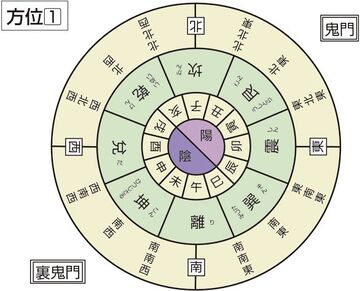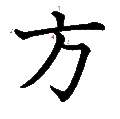Difference between revisions of "方"
(Created page with "方 (X65B9) is unicode character number 26041, KanjiLiberal. In Japanese, 方 can be pronounced as "Hou" (ほう) and may mean geographical...") |
|||
| Line 131: | Line 131: | ||
!--> |
!--> |
||
| − | These expressions have similar meaning (fig.1); for this reason, this meaning is attributed to the first ( |
+ | These expressions have similar meaning (fig.1); for this reason, this meaning is attributed to the first (and common) character in these expressions. |
==Graphic== |
==Graphic== |
||
Latest revision as of 19:24, 24 June 2021
方 (X65B9) is unicode character number 26041, KanjiLiberal.
In Japanese, 方 can be pronounced as "Hou" (ほう) and may mean geographical direction (north, south, west, east and intermediate orientations): 北, 南, 西, 東, 北南,..
方 (X65B9) is easy to confuse with KanjiRadical ⽅ (X2F45): some software use similar pictures for these two characters.
⽅ and 方
The two characters look similar. Some programming is required to avoid confusion.
Encoding of characters ⽅ and 方 can be revealed with program du.t
File uni.t also may be required and, in such a case, should be loaded. Then, command
php ../du.t ⽅方
returns the following output:
The array has 6 bytes; here is its splitting:
e2 bd 85 e6 96 b9
array(2) {
[0]=>
string(3) "⽅"
[1]=>
string(3) "方"
}
Unicode character number 12101 id est, X2F45
Picture: ⽅ ; uses 3 bytes. These bytes are:
xE2 xBD x85 in the hexadecimal representation and
226 189 133 in the decimal representation
Unicode character number 26041 id est, X65B9
Picture: 方 ; uses 3 bytes. These bytes are:
xE6 x96 xB9 in the hexadecimal representation and
230 150 185 in the decimal representation
Semantic
⽅ may refer to direction at the surface of the Earth or at a geographic map: 北, 西,東, 南.
Usually, the map is oriented in such a way, that the north (北) is at the top, and South (南) is at the bottom.
KanjiRadical ⽅ (X2F45 has similar meaning.
Phonetic
Usually, 方 is pronounced as ほう , Hou.
KanjiRadical ⽅ (X2F45) has similar pronunciation.
However, word/sound Hou (ほう) may have also other meanings:
政 (X653F), put, release, free, liberate [2]
Examples
方 appears in the following combinations:
These expressions have similar meaning (fig.1); for this reason, this meaning is attributed to the first (and common) character in these expressions.
Graphic
Pictures of 方 look similar to the symbol \( \hbar \) of the reduced Planck constant ( \( \hbar \approx 1.054571817 \times 10^{-34} ~ \text{J}{\cdot}\text{s}\) ).
Drawing of character X2F45 ⽅ and similar character X65B9 方 in figure at right is suggested by jitenon [7]
Confusion
The confusive similarity of characters X2F45 ⽅ and X65B9 方 may cause mistakes: in some cases, the two characters are treated as the same, and in some cases as different.
This confusion is recognized [8][9].
In cases of such a confusion, the ascii names X2F45 and X65B9 can be used instead of KanjiRadical ⽅ and KanjiLiberal 方.
References
- ↑ https://kotobank.jp/word/方位-131742 .. デジタル大辞泉「方位」の解説 ほう‐い〔ハウヰ〕【方位】 1 ある方向が、基準の方向に対してどのようであるかの関係を表したもの。通常は子午線の方向を北・南、これに直角に交わる方向に東・西を定めた4方位を基準とし、その中間を北東・北西・南東・南西として加え8方位に、さらにその中間に北北東・南南西などをとり16方位に、さらに細分して32方位にして示す。古くは12の方向に分けて十二支を配し、北を子(ね)、北東を丑寅(うしとら)などとよんだ。天文学・測地学では、方位角を用いて表す。 2 各方角に陰陽・五行(ごぎょう)・十二支・八卦(はっけ)などを配し、それぞれに吉凶があるとする民間信仰。恵方(えほう)・金神(こんじん)・鬼門などの俗信を生んだ。「方位を見る」
- ↑ https://graphemica.com/放 Chinese, Japanese, Korean (cjk) unified ideograph (U+653E) .. put, release, free, liberate
- ↑ https://graphemica.com/法 Chinese, Japanese, Korean (cjk) unified ideograph (U+6CD5) law, rule, regulation,.. (2021)
- ↑ https://ja.wikipedia.org/wiki/方位 方位(ほうい)とは、ある地点における水平面内の方向を、基準となる一定の方向との関係で表した物。または、基準となるべき幾つかの方向に付けた名称である。方角(ほうがく)もほぼ同義である、
- ↑ https://ja.wikipedia.org/wiki/方向 数学における方向(ほうこう)とは、2つの向き(むき)を合わせた表現。向き(むき)を空間上の位置を極座標で表したとき、数値が持つ距離以外の情報である。向きと大きさを持つベクトルから、大きさを取り去った残りの情報と言ってもよい。 一つの方向に沿った距離や移動, 速度等を考えるとき、一方の向きを正の値で表すならば、もう一方の向き は負の値を以て表される。 n 次元空間での向きの自由度は、n から大きさの 1 を引いた n - 1 である。向きは単位ベクトル、あるいは、単位球(2次元空間内なら単位円)上の1点で表すことができる。// なお、物理においては、方向とは、上下方向、左右方向などのように単に直線の状態を意味するが、これに対して向きとは、下向き、右向きなどのように、ある始点から一方へ向かっての進行を意味するときに用いる。「地球の重力は、鉛直方向にはたらいており、向きは下向きである」などのように、方向と向きを使い分ける。 以下では、数学における方向について述べる。
- ↑ https://ja.wikipedia.org/w/index.php?title=方角&redirect=no Redirect to https://ja.wikipedia.org/wiki/方位
- ↑ 7.0 7.1 https://kanji.jitenon.jp/kanji/222.html 方の書体 方の書体(筆順付き教科書体) 明朝体 教科書体 教科書体 筆順) この漢字をコピー Unicode U+65B9 JIS水準 JIS第1水準 漢検級 9級 学年 小学校2年生
- ↑ https://util.unicode.org/UnicodeJsps/character.jsp?a=2F45 ⽅ 2F45 KANGXI RADICAL SQUARE Han Script id: allowed confuse: 方
- ↑ https://util.unicode.org/UnicodeJsps/character.jsp?a=65B9 方 65B9 CJK UNIFIED IDEOGRAPH-65B9 Han Script id: restricted confuse: ⽅


